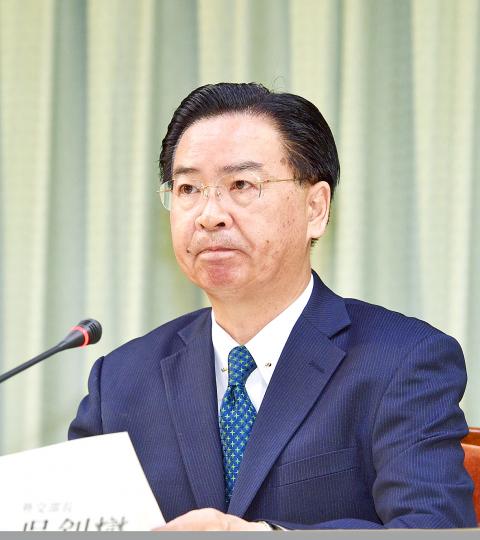Minister of Foreign Affairs Joseph Wu (吳釗燮) on Friday pledged to pay more attention to the psychological health of ministry officials, after the nation’s envoy to Osaka committed suicide amid criticism over his office’s assistance to Taiwanese tourists in need.
In an open letter to ministry officials at home and abroad sent on Friday and provided to reporters yesterday, Wu said that he was heartbroken over the passing of Taipei Economic and Cultural Office Osaka branch director-general Su Chii-cherng (蘇啟誠).
“Su left behind his wife and children… I blame myself for the break-up of his family due to work, and the pressure he faced from within and from outside,” Wu wrote in the letter. “I am writing this letter to tell you that the ministry needs to make improvements and should take better care of your physical and psychological health, as well as your family life.”

Photo: Peter Lo, Taipei Times
Su, who assumed leadership of the Osaka office in July, took his own life early on Friday at his residence in Osaka, Japan, about a week after his office came under fire for a staff member’s alleged refusal last week to help a Taiwanese tourist stranded in Osaka in the wake of Typhoon Jebi find accommodation.
Japan Broadcasting Corp (NHK) on Friday reported that a note left by Su suggested that he had been in pain because of overwhelming public criticism over his office’s handling of Taiwanese tourists stranded in the area due to Jebi and the ensuing closure of Osaka’s Kansai International Airport.
Wu said that although diplomacy is Taiwan’s toughest battle, the nation’s diplomats have worked in all corners of the globe to ensure that the 23 million Taiwanese will not be left alone or forgotten by the world.
They often have to work long hours at their offices, answering telephone calls from overseas, writing diplomatic cables and arranging the itineraries of visiting foreign dignitaries, Wu said, adding that they give their best, even though their work is often overlooked, because they know that the nation’s diplomatic work rests on their shoulders.
“When we are faced with challenges from all over the world, we must not forget that the ministry is one big family, and we should show concern and support for each other,” Wu said, calling on ministry officials to stay brave and united as they work toward their common goals.
President Tsai Ing-wen (蔡英文) on Friday wrote on Facebook and Instagram that the burden shouldered by diplomatic personnel is very heavy.
“Their contributions and efforts represent the hope of 23 million people in Taiwan to connect with the international community,” Tsai wrote, adding: “Thank you.”
Additional reporting by CNA

A strong continental cold air mass is to bring pollutants to Taiwan from tomorrow, the Ministry of Environment said today, as it issued an “orange” air quality alert for most of the country. All of Taiwan except for Hualien and Taitung counties is to be under an “orange” air quality alert tomorrow, indicating air quality that is unhealthy for sensitive groups. In China, areas from Shandong to Shanghai have been enveloped in haze since Saturday, the ministry said in a news release. Yesterday, hourly concentrations of PM2.5 in these areas ranged from 65 to 160 micrograms per cubic meter (mg/m³), and pollutants were

Taiwan’s armed forces have established response protocols for a wide range of sudden contingencies, including the “Wan Chun Plan” to protect the head of state, the Ministry of Defense (MND) said today. After US President Donald Trump on Saturday launched a series of airstrikes in Venezuela and kidnapped Venezuelan President Nicolas Maduro, concerns have been raised as to whether China would launch a similar “decapitation strike” on Taiwan. The armed forces regularly coordinate with relevant agencies and practice drills to ensure preparedness for a wide range of scenarios, Vice Minister of National Defense Hsu Szu-chien (徐斯儉) told reporters before a

EVA Airways on Saturday said that it had suspended a pilot and opened an investigation after he allegedly lost his temper and punched the first officer several times as their plane was taxiing before takeoff at Los Angeles International Airport. According to a report published on Thursday by The Reporter, the incident occurred after the flight’s Malaysian first officer tried to warn the Taiwanese pilot, surnamed Wen (文), that he was taxiing faster than the speed limit of 30 knots (55.6kph). After alerting the pilot several times without response, the first officer manually applied the brakes in accordance with standard operating

Japanese Councilor Hei Seki (石平) on Wednesday said that he plans to visit Taiwan, saying that would “prove that Taiwan is an independent country and does not belong to China.” Seki, a member of the Japan Innovation Party, was born in Chengdu in China’s Sichuan Province and became a naturalized Japanese in 2007. He was elected to the House of Concilors last year. His views on the Chinese Communist Party (CCP) — espoused in a series of books on politics and history — prompted Beijing to sanction him, including barring Seki from traveling to China. Seki wrote on X that he intends